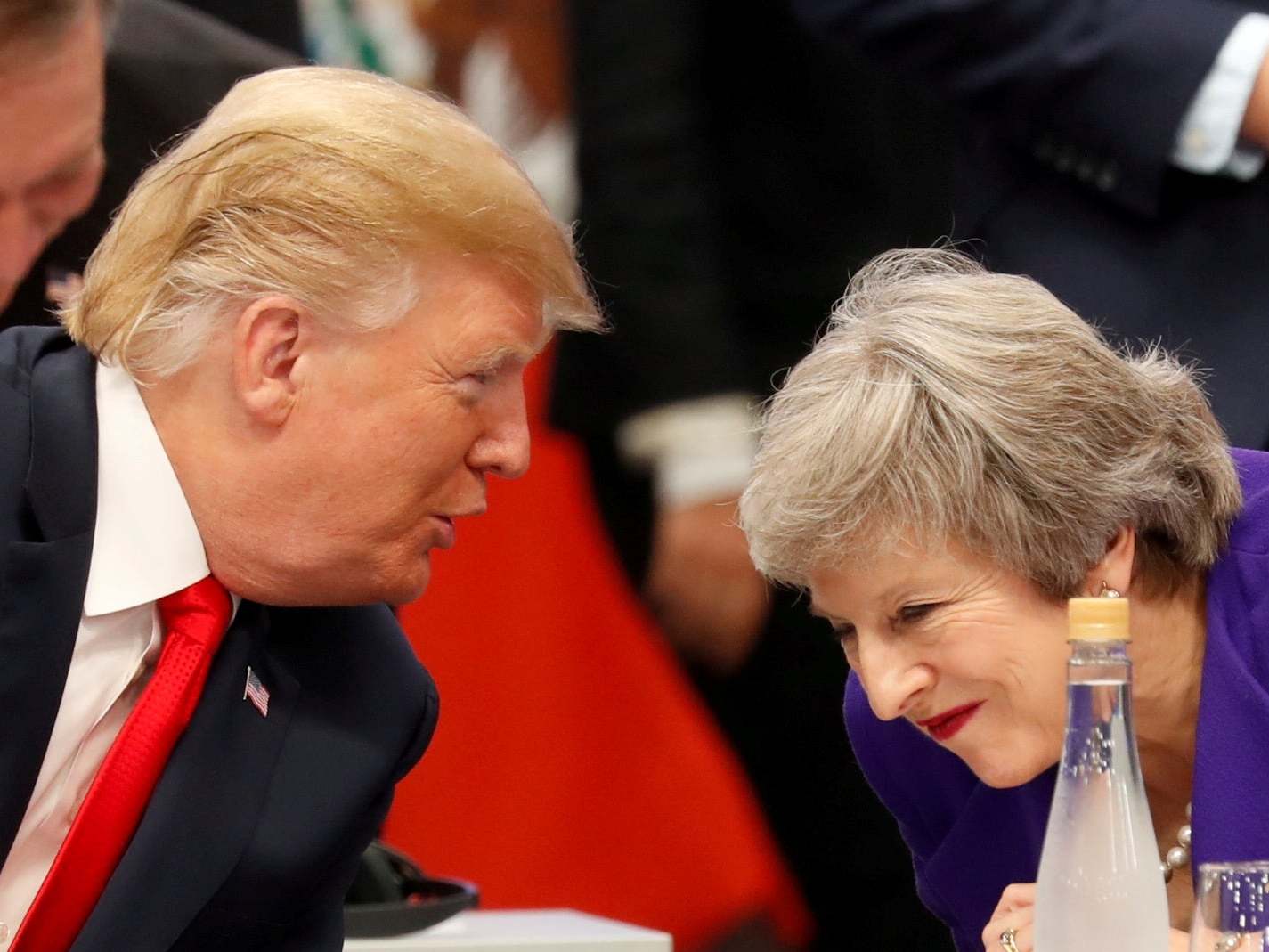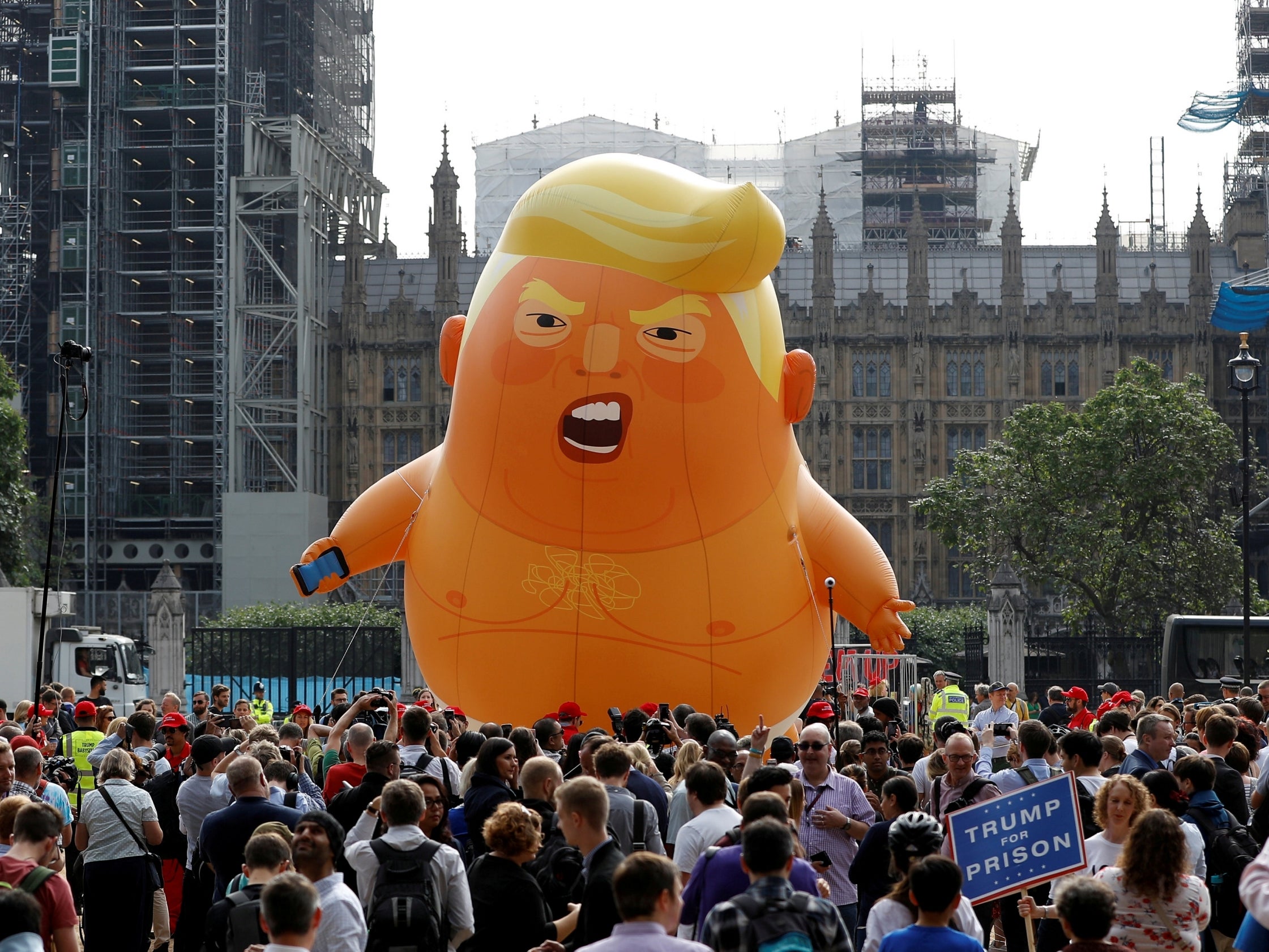Trump UK visit: What to expect from the president’s controversial trip
He has generated an unparalleled level of hostility, but that won’t stop Donald Trump pushing his anti-Iran and Huawei agenda

Your support helps us to tell the story
From reproductive rights to climate change to Big Tech, The Independent is on the ground when the story is developing. Whether it's investigating the financials of Elon Musk's pro-Trump PAC or producing our latest documentary, 'The A Word', which shines a light on the American women fighting for reproductive rights, we know how important it is to parse out the facts from the messaging.
At such a critical moment in US history, we need reporters on the ground. Your donation allows us to keep sending journalists to speak to both sides of the story.
The Independent is trusted by Americans across the entire political spectrum. And unlike many other quality news outlets, we choose not to lock Americans out of our reporting and analysis with paywalls. We believe quality journalism should be available to everyone, paid for by those who can afford it.
Your support makes all the difference.Donald Trump’s visit to Britain last year was little more than a stopover between his first Nato summit and his meeting with Vladimir Putin, the man who, it is claimed, helped to put him in the White House through manipulating the US presidential election.
Even that very short trip, perhaps inevitably, was long on controversy, with the US president criticising Theresa May and her Brexit strategy in a newspaper interview the day before he flew in. He also declared that Boris Johnson “would make a great prime minister” as well as attacking London mayor Sadiq Khan over terrorist attacks. There were anti-Trump protests across the country and a giant inflatable Trump baby flew over London.
The trip last July had been initially envisaged as a state visit, but this was changed after widespread outcry. Trump’s arrival next week, with his extended family, will, this time, be a full state visit, as opposed to an official or a working one. He will be only the third US president to have what is considered a great honour after George W Bush and Barack Obama.
But this visit too is surrounded by controversy. Trump has preceded it by describing Nigel Farage and Boris Johnson, one of the 12 Tory contenders to replace Ms May, as “big powers” who “have done a good job”. The US president has said he would like to meet these “friends” while he is here.
Farage and Johnson (who once accused Trump of “stupefying ignorance that makes him frankly unfit to hold the office of president of the United States”) would, no doubt, relish photo opportunities with the US president. It would certainly boost their profiles with their constituencies.
But there have been clear messages from other politicians that the current US president is unwelcome. Trump has generated an unparalleled level of hostility. Unlike Obama, or Bill Clinton or Ronald Reagan, he will not be allowed the joint session of the Houses of Parliament. This is due to opposition from many MPs across the parties, as well as the Commons speaker John Bercow who, along with the leader of the opposition Jeremy Corbyn and Liberal Democrat leader Vince Cable, will boycott the state banquet held by the Queen.
There have been some changes for the Trump Presidency and Theresa May’s UK since last year; but many things have also remained the same. The US president’s meeting with Putin did nothing to allay suspicions among critics that he was the Muscovian candidate for the White House. An example given is that Trump, an equal opportunities insult of all and sundry, still has not uttered one single word against Putin, continuing the speculation on what exactly the Russian leader has on him.
The investigation by Robert Mueller which had hung over Trump’s presidency has ended, but it did not, as the president and his supporters claim, result in his exoneration. The shadow of “Russiagate” and the threat of impeachment stays on, as Mueller’s public statement on Wednesday, the reaction in Congress and the media, and Trump’s convoluted barrage of tweets show.
Trump’s two summits with another strongman, Kim Jong-un, did not lead to the solving of North Korea’s nuclear problem as the US president had claimed it would do. Trump tried to dismiss Pyongyang’s recent test firing of missiles as no big deal, but he has been contradicted by his national security advisor, John Bolton, and acting defence secretary, Patrick Shanahan, who have said publicly that there were clear violations of UN resolutions.
North Korea is not the only issue in which Trump appears to be at odds with his senior officials. He is said to be annoyed with the hawkish Bolton and, to a lesser extent, secretary of state Mike Pompeo, over the deployment of an aircraft carrier strike group and B-52 bombers to the Gulf in the confrontation with Iran and sabre rattling on Venezuela where they had supposedly predicted a quick regime change. Trump, who is not a war-like president, is said to feel he is being dragged into foreign adventures.
But Trump falling out with his officials is nothing new. This White House has had a churn of staff like no other in recent times. Bolton, for instance, is his third national security advisor after Lieutenant General Michael Flynn was indicted by the Mueller investigation and Major General HR McMaster resigned.
In Britain, Theresa May’s government has also had an unprecedented number of resignations and now she herself has gone, officially stepping down just after the president finishes his visit. This lends a certain surreal aspect to the visit and raises questions about what she would say to Trump who had belittled her and praised her internal party rivals.

Angela Merkel, finishing her distinguished political career, has been assertive in standing up to the Trump administration. At the last meeting of the annual Munich security conference the German chancellor gave a robust response to US vice president Mike Pence who had complained about European partners on a variety of issues from foreign to trade policies. That, say observers, is not May’s way and she is expected to stay quiet and maintain decorum.
We do know broadly the issues Trump and his team would be focusing on through information which has come from their outriders.
Bolton has stated that there would be renewed attempts to get the UK to swing behind the American attempts to dismantle the nuclear deal with Iran. Britain, along with the other signatories to the JCPOA (Joint Comprehensive Plan of Action) as well as the UN have repeatedly affirmed that the deal is working and are attempting to save it.
The European Union is putting together a financial programme which seeks to enable businesses to trade with Iran in the face of US sanctions. Bolton held up the possibility that Britain’s position may change after Brexit. “By definition as an independent country you can make up your own policy, it’s different once you are outside the European Union,” he said in London on Thursday. The UK however had signed up to the programme as a JCPOA signatory and not a European Union member.
There will be tremendous pressure to bar the Chinese technology giant Huawei from the UK telecommunications network. Trump, according to multiple reports, will warn that there could be problems with intelligence sharing if the Chinese firm, which has been accused of being an arm of the Chinese government, is allowed in. Bolton stated “everybody is catching up to the dangers posed, especially in 5th generation telecommunications systems, by equipment from Huawei that can allow foreign governments a back door into systems”.
The Americans could well succeed on Huawei. The decision to allow the company in was leaked from a National Security Council meeting. May, it was revealed, overrode the objections of five cabinet ministers to drive the decision through, although no official announcement has been made yet. It is unlikely that any of her Tory successors would stick to that position, especially as other allies of Britain are also putting restrictions on the Chinese company.
“At the end the UK will have to choose between China and the US on this and I can’t see a Conservative prime minister taking on the US on this, it just isn’t worth it on so many grounds” said Robert Emerson, a security analyst.
Trump has been pressing for Britain to go for a hard Brexit, offering a quick trade deal with America as the carrot. But with the withdrawal process remaining unclear and uncertain it remains very doubtful that anything could be settled on this.
Ian Bond, director of foreign policy at the Centre for European Reform, pointed out “The UK is still lurching around, seeking a way out of the Brexit swamp. It may leave the EU with or without a deal, but it may not.
“If the UK leaves the EU with no deal the US will be in a stronger position to pursue its own far-reaching objectives for trade negotiations – which offer the UK no special favours. Trump will no doubt press the UK for bankable concessions even before formal negotiations start, but it is hard to see how May could commit any of her possible successors to anything specific; at most she and Trump could set the tone for future talks.”
Join our commenting forum
Join thought-provoking conversations, follow other Independent readers and see their replies
Comments